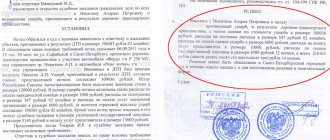Even if the court of appeal refused to satisfy your appeal, and the judicial acts have already entered into force, you can cancel or change them by appealing to the district court by filing a cassation appeal.
The cassation court will cancel or change judicial acts when the conclusions of the courts do not correspond to the facts or evidence existing in the case, as well as if the courts have violated legal norms.
Therefore, a cassation appeal must be carefully prepared with references to regulations and judicial practice. Your chances will increase if the complaint is prepared by a professional lawyer.
Who has the right to appeal a court decision?
In cassation, judicial acts can be appealed by the parties, as well as by the prosecutor, regardless of participation in the case.
In addition, if the rights or obligations of a person are affected by a judicial act, then he also has the right to challenge it. But, if you did not participate in court, then you will have to prove that the decision or ruling of the court somehow affected your interests.
Cassation appeal to the arbitration court: IMPORTANT
The procedure, grounds, and deadlines for appeal are regulated by Chapter 35 of the Arbitration Procedure Code of the Russian Federation.
Results and chances of challenging the cassation in the Supreme Court
If you filed a complaint with the Supreme Court and were denied consideration at a court hearing, do not stop. There is an extraordinary procedure for appealing a cassation ruling of an arbitration court. You have the right to write a complaint addressed to the Chairman of the RF Armed Forces. There are no restrictions on the timing and number of applications.
This is important to know: Addition to the appeal in the arbitration process
Does this work in practice? Yes, if you are confident that you are right and are ready to fight to the end. There have been cases where a complaint was submitted to the Chairman several times, and, in the end, the decisions of lower authorities were annulled by the Supreme Court.
The representative in the arbitration process is required to be highly qualified and have a thorough knowledge of legal norms. The outcome of the case depends entirely on the correct completion of the papers and the completeness of the evidence provided.
Unlike the company's in-house lawyers, the cassation lawyer has extensive experience in challenging the cassation ruling of the arbitration court. The legal bureau “Kakhiev and Partners” will provide consultations, collect and prepare a package of documents, and develop a clear legal position.
How to write a complaint to arbitration
So, in your cassation appeal, be sure to indicate:
- county court
- the court that adopted the controversial judicial act,
- details of the parties,
- date and number of the decision, resolution that you are challenging,
- your arguments and demands,
- list of attached documents.
Don't forget to include:
- appealed judicial acts,
- confirmation that the complaint has been forwarded to other persons,
- documents confirming payment of state duty (3000 rubles),
- power of attorney (if the complaint was signed by a representative).
Be careful, the court will leave the complaint without progress if you forget to indicate or attach something.
Note! The court will return the complaint if:
- the representative does not have the appropriate powers,
- the complaint is not signed,
- the judicial act was not challenged in the appellate instance,
- the deadline for appeal was violated, and a petition for its restoration was not sent.
Along with your complaint, you can send petitions to:
- On suspension of execution of a court decision until a ruling is made in the case,
- On the restoration of the period for appeal,
- On deferment of payment of state duty.

5.Term of cassation appeal
Decisions in cases of challenging regulatory legal acts enter into legal force immediately after their adoption (Part 2 of Article 180, Part 4 of Article 195 of the Arbitration Procedure Code of the Russian Federation), therefore the period for cassation appeal of such decisions is calculated from the date of their adoption and is 1 month from day of entry into force (part 7 of article 195 of the Arbitration Procedure Code of the Russian Federation).
To appeal decisions made:
when approving a settlement agreement;
in cases of challenging an arbitration court decision;
This is important to know: Application for reimbursement of legal expenses Arbitration court
in cases of issuing a writ of execution for the forced execution of an arbitration court decision;
in cases of recognition and enforcement of decisions of foreign courts or arbitrations, a monthly period for cassation appeal is also established, calculated from the date of the ruling (part 8 of article 141, part 5 of article 234, part 5 of article 240, part 3, Article 245 of the Arbitration Procedure Code of the Russian Federation).
Determinations in cases of insolvency (bankruptcy) (Part 3 of Article 223 of the Arbitration Procedure Code of the Russian Federation), decisions in cases considered in summary proceedings (Part 4 of Article 229 of the Arbitration Procedure Code of the Russian Federation), as indicated in the Arbitration Procedure Code of the Russian Federation, can be appealed accordingly to within 10 days or within a month from the date of acceptance by the appellate instance, which does not exclude the possibility of appealing them directly to the cassation instance, bypassing the appeal.
According to Part 3 of Art. 180 of the Arbitration Procedure Code of the Russian Federation, a special procedure for the entry into force of decisions in cases of administrative offenses and some other cases (and determining the beginning of the period for their cassation appeal) may be provided for by the Code or other federal law. For example, the 2-month period for cassation appeal of decisions in cases of bringing to administrative liability and in cases of challenging the decision of an administrative body on bringing to administrative liability begins after 10 days from the date of the decision, if it is not appealed, or from the day adoption of a decision of the appellate instance, if such a decision is not canceled or changed during the appellate review (part 4 of article 206, part 5 of article 211 of the Arbitration Procedure Code of the Russian Federation).
The period for cassation appeal of decisions of the appellate instance is calculated from the date of their adoption (Part 5 of Article 271 of the Arbitration Procedure Code of the Russian Federation). By virtue of Part 1 of Art. 266 of the Arbitration Procedure Code of the Russian Federation, the date of adoption of the decision of the appellate instance, when only its operative part is announced at the court hearing, should also be considered the date of production of the full (motivated) decision (paragraph 2, part 2, article 176 of the Arbitration Procedure Code of the Russian Federation).
Violation of the rules on the 5-day period for drawing up a full (motivated) decision, resolution (paragraph 2, part 2, article 176 of the Arbitration Procedure Code of the Russian Federation) or on reporting the date of their preparation (paragraph 1, part 2, article 176 of the Arbitration Procedure Code of the Russian Federation), as well as the rules on sending a copy of the decision or resolution to the persons participating in the case within 5 days from the date of adoption of the decision, resolution (Part 1 of Article 177, Part 4 of Article 271 of the Arbitration Procedure Code of the Russian Federation) does not entail a change in the procedure for the entry of a judicial act into law force and, therefore, the procedure for calculating the period for cassation appeal. However, these circumstances significantly affect the exercise by persons participating in the case of the right to cassation appeal and therefore have legal significance as valid reasons for missing the deadline for cassation appeal.
The Arbitration Procedure Code of the Russian Federation does not directly regulate the procedure for calculating the period for cassation appeal of a decision in the event of a decision in the appellate instance to terminate the proceedings on the appeal, i.e. at the end of the appeal proceedings without reviewing the appealed act on its merits. It seems that in such cases the period for filing a cassation appeal should be calculated from the moment the ruling to terminate the appeal proceedings is made, since until that moment there were no grounds for a cassation review: the judicial act did not enter into legal force.
How to write a complaint to the arbitration court
To increase the chances of your claims being met, follow these guidelines:
write the main arguments at the beginning,
do not quote legislative acts in full, the court already knows them, make the necessary excerpts and references,
indicate case law in your district or acts of the Supreme Court,
do not write that you do not agree with the courts’ assessment of your evidence, justify your disagreement with the decision as a violation of legal norms, or contradictions between the court’s conclusions and the circumstances of the case,
It is advisable to indicate the pages of the case on which the evidence you are referring to is located, this will make it easier for the court to find the necessary document.
How to file a cassation appeal to the arbitration court
The complaint is filed through the court that decided the case. This is done so that a court case is sent along with the complaint.
A cassation appeal to the arbitration court can be sent by mail, filed electronically, or delivered by you (or a representative lawyer) to the court office.
If the district court does not uphold your appeal
If you lose in the court of cassation, this is not a final defeat. There is also a second cassation - the Collegium on Economic Disputes of the Supreme Court.
Submit your complaint by mail or through the “My Arbitrator” system, but no later than two months from the date of entry into force of the last judicial act in the case.
You can also ask for the missed deadline to be reinstated.
Not all complaints reach the board.
First, the complaint is considered by a judge of the Supreme Court, he independently decides whether to transfer it to the collegium for consideration or not.
Of course, a refusal can be appealed to the Chairman of the RF Supreme Court or his deputies, but the percentage of satisfaction of such appeals is small.
Therefore, if you want your complaint to be accepted, then carefully approach its writing:
- indicate only a significant violation of legal norms,
- prove that without amending or repealing judicial acts it is impossible to restore your violated rights, as well as public interests (if they are violated),
- indicate that the disputed judicial acts violate the uniformity of judicial practice, confirm your position with references to the judicial practice of your district or the Supreme Court.
Otherwise, the structure of the complaint and its annexes are the same as when challenging judicial acts in a district court.
What issues does the cassation court consider?
The responsibilities of the cassation commission include checking the court documents that have entered into force - their validity and compliance with current legislation. The cassation court has more powers, but complete cancellation or challenge of decisions of lower courts is possible only if the appeal hearing is repeated in the standard manner.
But there is a problem with arbitration authorities - they do not review evidence and case materials . Their task is to consider the legality of the verdicts made, in accordance with legal norms. When the verdict of the first and second appellate instances is essentially correct, the course of the arbitration hearing is not considered, and neither the plaintiff nor the defendant can challenge the verdict on this basis.
Grounds for appealing a court decision
Citizens, before contacting supervisory authorities, need to make sure that their complaint is justified. There are cases when the cassation commission refuses to consider the case and it is impossible to challenge this decision in the usual manner.
Among them:
- the application does not comply with the rules for filing and processing such documents;
- there is no confirmation of payment of the state fee;
- the deadline for appealing the verdict has passed, and the defendant or plaintiff has not filed a corresponding petition to extend it.
But there are options when the losing party has the right to challenge the court verdict and appeal to higher arbitration authorities.
The refusal of the cassation commission to review the case is subject to challenge if the verdict of the first court was rendered under the following conditions:
- the case was considered by persons without appropriate authority;
- the trial did not involve the full composition of the court;
- the issue was considered in the absence of the plaintiff or defendant, who were not properly notified of the time and place of the court hearing;
- the decision was made regarding the civil rights and obligations of persons who were not involved in the case;
- the arbitration court did not consider all the claims, and this point was not eliminated during the appeal process;
- the consideration of the case was conducted illegally, with violations that are already considered by the criminal code.
On these grounds, individuals or legal entities have the right to submit the case for review and challenge it in higher courts.
Where to contact?
So, the second and third instances refused to change the verdict, and the question arises - how to challenge the decision of the cassation court and to whom to appeal? There is only one way out - filing a supervisory appeal to the Supreme Court , in accordance with paragraph 1, article 391 of the Code of Civil Procedure of the Russian Federation.
To consider it, it is necessary to submit to the supervisory court all relevant documents, copies of the decisions of the appeal and cassation commission. It is important to attach a properly completed statement of claim, which indicates the grounds and reasons for challenging the decision of the cassation commission.
Statement of claim
When conducting a case by a supervisory commission, a package of documents and evidence is very important. In addition, in order to challenge the decision of the cassation court, you need to correctly fill out the statement of claim.
Basic requirements for a complaint:
- name of the addressee court;
- for an individual, full name of the applicant, with contact details;
- for a legal entity - the name of the organization, with the specified OGRN and TIN, with contact details;
- the procedural status of the applicant in the contested case;
- addresses and contact numbers of all participants in the process - defendant, plaintiff, third parties;
- content of court decisions of lower authorities, including arbitration;
- an indication of which decisions are subject to challenge and for what reason;
- a clearly formulated request to the supervisory authority.
When drawing up a complaint to challenge a decision of the cassation court, we recommend adhering to the above standards. To make the task easier, you can use a sample statement of claim and consult with our lawyer, who will point out any shortcomings in filling out the document.
People who spend long months in court proceedings often have a question: within what period can a cassation court decision be appealed? This point is discussed in paragraph 2, Article 391 of the Code of Civil Procedure of the Russian Federation - the subject can challenge the decision three months after the date of entry into force of the last legal act. After this period, the decision of the cassation commission cannot be contested.
Similar
The advantage of the Arbitration Court is unquestioning execution. But his decision can also be challenged. Reasons Objective...
Not all citizens agree with the court ruling. To challenge a verdict, you must comply with the conditions...
The court of first jurisdiction considers a large number of cases, both administrative and criminal, and issues...
Article 181 of the Arbitration Procedure Code of the Russian Federation implies that the decision of the arbitration court is challenged in the arbitration court of cassation. The question arises,…
This is important to know: Leaving a complaint without consideration under the Code of Administrative Offenses of the Russian Federation
Today, it is not uncommon for multi-storey buildings to experience flooding. They can arise due to...
When a potential borrower takes out a mortgage, he hopes for the best. Realizing that he is taking a risk, he is sure...
Cassation appeal in an arbitration case: assistance from a lawyer
Lawyers at Legal Guarantee have extensive experience in arbitration disputes in various instances, including the Supreme Court of the Russian Federation.
We protect the interests of the principal and prepare all the necessary documents for the trial.
We do not have standard solutions - each sample cassation appeal is individual and drawn up in accordance with your situation.
How much does it cost to file a cassation appeal to arbitration?
Individual cost calculation
Find out today how much it costs to file a complaint in your case and whether your arbitration dispute is promising.
Assessing the prospects of a dispute is a gift! To know
Do you have another question or do you need urgent assistance from a lawyer?
How to order the preparation of documents for the court in “Legal Guarantee”?
Our office in Moscow
You will receive qualified assistance from our Law Office in Moscow at:
Moscow, Avtozavodskaya 23A, building 2, office 320.
Sign up for a consultation : +7
Sign up online
Is it possible to restore the missed deadline?
According to Part 2 of Article 276 of the Arbitration Procedure Code of the Russian Federation, the court has the right to restore the deadline for filing a cassation appeal if a person, for reasons beyond his control, was unable to appeal to the court on time. At the same time, the restoration of such a period is limited to a period of 6 months - accordingly, if this period is missed, the person is deprived of the right to a cassation appeal, regardless of the degree of respect for certain circumstances.
The procedure for restoring the deadline is described in detail in paragraph 4 of the resolution of the Plenum of the Supreme Arbitration Court “On the application...” of September 24, 1999 No. 13, according to which the deadline for filing a complaint can be restored by the court when the applicant submits a corresponding petition. The latter, as a rule, is attached to the complaint or sent until a determination is made on it. Accordingly, in the case of a positive decision, the court, in its decision to accept the complaint for consideration, indicates the fact that the deadline for filing such a complaint has been restored.
This is important to know: Is it necessary to clarify the claims to the defendant?
What reasons can be valid?
An approximate list of circumstances that can be taken into account by the court is contained in paragraph 14 of the resolution of the Plenum of the Supreme Arbitration Court No. 36. These include the inability of a person, for various reasons, to familiarize himself with the contents of a court decision or ruling, which arose due to the delay in their production or sending due to fault as judicial authorities and the postal service. A valid reason is also recognized as a situation where a person could not adequately defend his interests in arbitration because he was not properly notified that his rights and obligations were affected during the process (usually in this case we are not talking about plaintiffs or defendants, and about third parties).
Expert opinion
Grigoriev Egor Kirillovich
Legal consultant with 7 years of experience. Specializes in criminal law. More than 3 years of experience in protecting legal interests.
At the same time, paragraph 14 of the Resolution of the Plenum of the Supreme Arbitration Court of the Russian Federation No. 36 specifically states that internal organizational reasons that did not allow timely filing of a cassation are not recognized as valid:
- absence of a lawyer in the organization;
- the need to coordinate the content of documents with management or other entities;
- location of responsible employees on a business trip, etc.
To summarize, it remains to be noted that in practice, when planning to file a cassation appeal, it is necessary to carefully understand which particular judicial act needs to be appealed. Depending on this circumstance, the deadline for filing a complaint will be counted.
More useful information can be found in the “Cassation Appeal” section.







